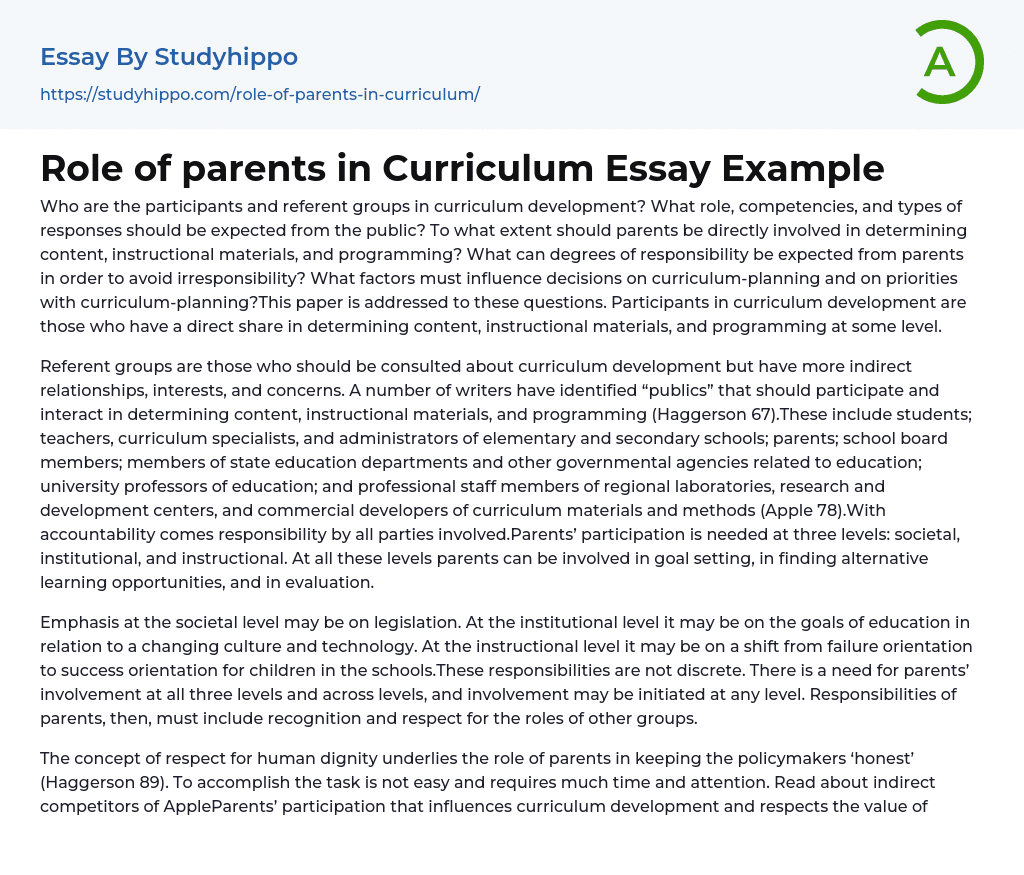Who are the participants and referent groups in curriculum development? What role, competencies, and types of responses should be expected from the public? To what extent should parents be directly involved in determining content, instructional materials, and programming? What can degrees of responsibility be expected from parents in order to avoid irresponsibility? What factors must influence decisions on curriculum-planning and on priorities with curriculum-planning?This paper is addressed to these questions. Participants in curriculum development are those who have a direct share in determining content, instructional materials, and programming at some level.
Referent groups are those who should be consulted about curriculum development but have more indirect relationships, interests, and concerns. A number of writers have identified “publics” that should participate and interact in determining content, instructional materials, and programming (Haggerson 67).These include students; teachers, curriculum
...specialists, and administrators of elementary and secondary schools; parents; school board members; members of state education departments and other governmental agencies related to education; university professors of education; and professional staff members of regional laboratories, research and development centers, and commercial developers of curriculum materials and methods (Apple 78).With accountability comes responsibility by all parties involved.Parents’ participation is needed at three levels: societal, institutional, and instructional. At all these levels parents can be involved in goal setting, in finding alternative learning opportunities, and in evaluation.
Emphasis at the societal level may be on legislation. At the institutional level it may be on the goals of education in relation to a changing culture and technology. At the instructional level it may be on a shift from failure orientation to success orientation for children in the schools.These responsibilities are not discrete. There is
need for parents’ involvement at all three levels and across levels, and involvement may be initiated at any level. Responsibilities of parents, then, must include recognition and respect for the roles of other groups.
The concept of respect for human dignity underlies the role of parents in keeping the policymakers ‘honest’ (Haggerson 89). To accomplish the task is not easy and requires much time and attention. Read about indirect competitors of AppleParents’ participation that influences curriculum development and respects the value of rational consent may be in town meetings or in elections to school boards and state and federal government offices (Apple 89). Although parents and other citizens are not generally as well prepared for selecting representatives as are teachers and students, they have the right to be represented meaningfully and the responsibility to become informed and actively involved.
- Interpretation essays
- Plagiarism essays
- Analogy essays
- Learning English essays
- Academia essays
- Academic And Career Goals essays
- Academic Integrity essays
- Brainstorming essays
- Brown V Board of Education essays
- Brown Vs Board Of Education essays
- Coursework essays
- Curriculum essays
- Distance learning essays
- Early Childhood Education essays
- Education System essays
- Educational Goals essays
- First Day of School essays
- Higher Education essays
- Importance Of College Education essays
- Importance of Education essays
- Language Learning essays
- Online Education Vs Traditional Education essays
- Pedagogy essays
- Philosophy of Education essays
- Purpose of Education essays
- Scholarship essays
- Study essays
- Studying Abroad essays
- Studying Business essays
- Technology in Education essays
- The Importance Of Higher Education essays
- Vocabulary essays
- Writing Experience essays
- Coaching essays
- Critical Thinking essays
- homework essays
- Learning essays
- Library essays
- Listening essays
- Literacy essays
- Mentor essays
- Physical Education essays
- Project essays
- Reading essays
- Research essays
- Sex Education essays
- Social Studies essays
- Standardized Testing essays
- Study Plan essays
- Teaching essays




